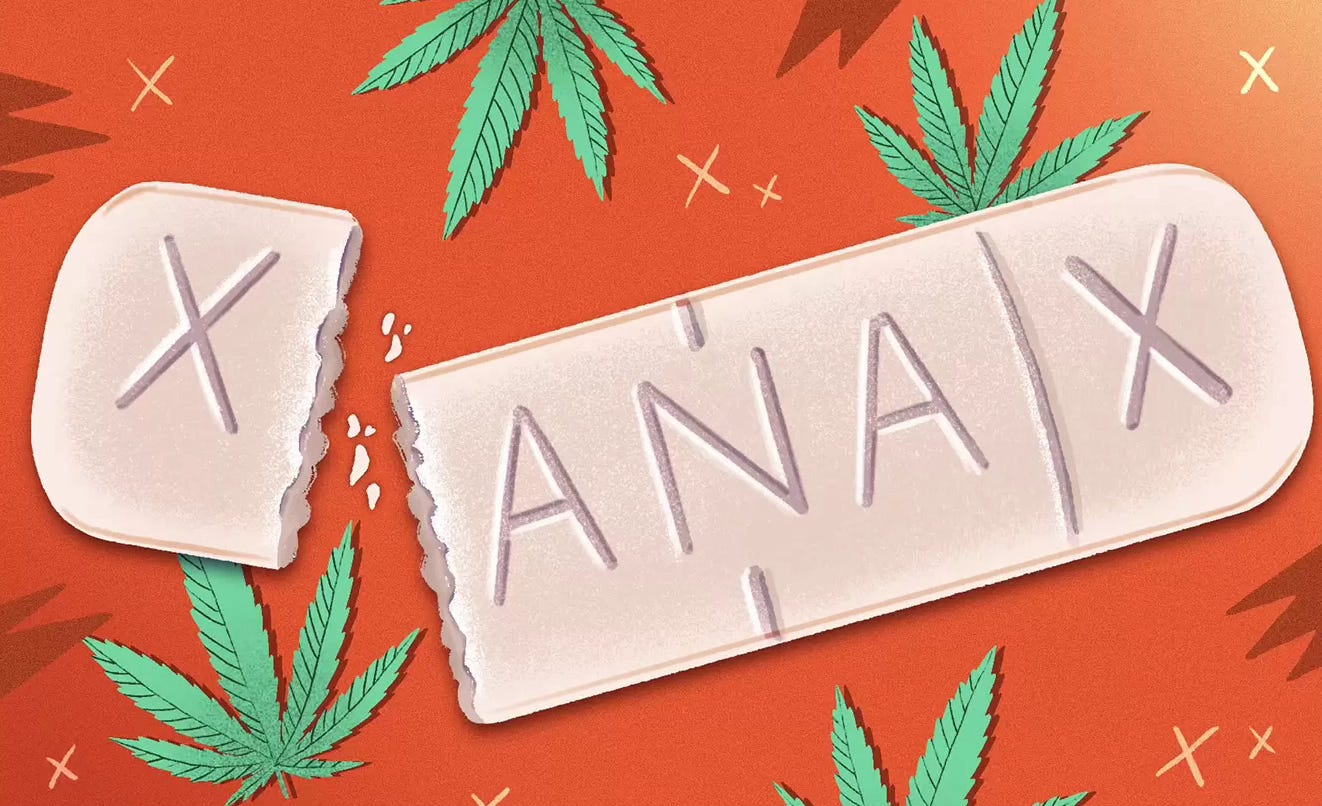People Are Replacing Xanax With Cannabis—Here’s What You Should Know
A new study shows that cannabis laws are changing the way people treat anxiety—here’s what’s really happening.
For decades, prescription medications like Xanax, Valium, and Klonopin have been the go-to treatments for anxiety and insomnia. But as cannabis legalization spreads across the U.S., a new trend is emerging—fewer people are filling prescriptions for benzodiazepines.
A recent study published in JAMA Network Open sheds light on this shift, revealing that in states with medical cannabis laws, benzodiazepine prescriptions dropped by 12.4%, while states with recreational cannabis saw an even greater reduction of 15.2%.
At the same time, antidepressant and antipsychotic prescriptions have increased in medical cannabis states.
So, what’s really happening? Are people replacing their anxiety meds with cannabis, or is the relationship more complicated? Let’s break it down.
Why Are Benzodiazepine Prescriptions Declining?
Benzodiazepines (or "benzos") are commonly prescribed for anxiety, panic attacks, and sleep disorders. While they’re effective, they come with serious risks, including:
Dependence and Withdrawal: Physical addiction can develop in just a few weeks, with withdrawal symptoms that range from severe anxiety to life-threatening seizures.
Cognitive Decline: Long-term use is linked to memory loss and an increased risk of dementia.
Falls and Accidents: Especially in seniors, benzos can cause dizziness, leading to dangerous falls and fractures.
Overdose Risk: Mixing benzos with alcohol or opioids can slow breathing to fatal levels.
Given these dangers, it’s no surprise that people are looking for safer alternatives. And cannabis, particularly CBD-rich strains, is gaining popularity as a natural option for anxiety relief.
One person shared:
"I started taking edibles about two months ago, and this is the best I've felt in years. Better mood, sleep, less anxiety. I was heavily leaning toward medication but decided to try this first. I'm glad I did."
But does cannabis actually work as a substitute for everyone?
Can Cannabis Really Replace Benzos?
Research suggests that cannabis—particularly CBD—can help with anxiety, insomnia, and stress. Unlike benzos, which work by depressing the central nervous system, cannabis interacts with the endocannabinoid system, which plays a role in regulating mood, sleep, and stress responses.
Real People, Real Experiences
Many individuals have successfully swapped out their anti-anxiety medications for cannabis. One user explained:
"Honestly, I had the best years of sleep with smoking. As soon as I had to stop to get a municipal job, the insomnia came back like normal."
Another said:
"Yeah, that’s the sole reason I got my card years back. I’ve seen what benzos and other meds are capable of doing to you—hard pass."
However, not everyone has a positive experience with cannabis. Some find that it actually worsens their anxiety:
"It COMPLETELY makes my anxiety worse. I get extremely paranoid, feel like I’m acting weird, and overanalyze everything. I forget what I’m doing every few minutes, and it makes my physical anxiety symptoms worse."
So why does cannabis seem to help some people while making others more anxious?
Why Are Some People More Anxious on Cannabis?
Cannabis isn’t a one-size-fits-all solution. How it affects anxiety depends on several factors:
THC vs. CBD Ratio: Higher THC levels can sometimes trigger paranoia, while CBD is known for its calming effects.
Dosage Matters: Many people make the mistake of taking too much, which can lead to anxiety. One user put it simply:
"People tend to smoke too much. Take two or three hits, and gradually take more if you need. If you start with three bong hits in a row or go crazy inhaling left and right, you’ll go straight into panic mode if you’re prone to anxiety."
Setting and Mindset: Some people find cannabis relaxing in certain settings but overwhelming in others.
"If I'm in a dark room watching a movie or sports, it is truly enjoyable and enhances the experience. But if I'm out in public, I get too anxious."
But Why Are Antidepressant Prescriptions Increasing?
If cannabis is replacing benzos, why are prescriptions for antidepressants (+3.8%) and antipsychotics (+2.5%) going up in medical cannabis states?
One possibility is that cannabis isn’t fully replacing medication but rather complementing it. Some people may still need antidepressants for long-term mood stabilization, while using cannabis for occasional anxiety or sleep issues.
Another theory? Increased mental health awareness. As cannabis becomes more accessible, more people may be seeking formal diagnoses and treatment for anxiety and depression, leading to higher prescription rates.
What This Means for Seniors and Those Seeking Alternatives
Seniors are often prescribed benzodiazepines at higher rates than younger adults, despite the serious risks of falls, cognitive impairment, and dependence.
Could cannabis be a safer alternative? Many experts believe that CBD and THC in the right ratios could offer similar relaxation benefits without the same level of risk.
For example, strains high in CBD and terpenes like myrcene and linalool may help with anxiety and sleep without strong psychoactive effects.
The Bottom Line: A Promising Trend, But More Research Needed
The drop in benzodiazepine prescriptions suggests that some people are turning to cannabis as a natural anxiety remedy. But the rise in antidepressant use shows that cannabis isn’t a cure-all for mental health.
Before replacing any prescription medications with cannabis, it’s essential to:
Consult your doctor or a cannabis-friendly healthcare provider.
Start low and go slow, especially with THC, as too much can increase anxiety.
Experiment with different strains and delivery methods, such as CBD oils, edibles, or low-THC flower.
As cannabis research continues, we may see even more shifts in mental health treatment. But for now, one thing is clear—people are looking for alternatives, and cannabis is becoming a major part of the conversation.
What Do You Think?
Have you used cannabis as an alternative to benzodiazepines or other anxiety medications? Tell us if you’ve made the switch.
Disclaimer:
The information provided on this blog is for educational purposes only and is not a substitute for professional medical advice. Always consult your healthcare provider before starting or changing any treatments, including cannabis use.




